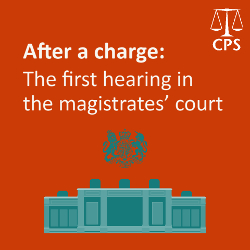The first hearing is sometimes used to decide whether a case should stay in the magistrates’ court or should be sent to the Crown Court.
This decision is usually based on the seriousness of the offence.
Less serious offences such as motoring offences or public order offences can usually only be tried in the magistrates’ court. These are called ‘summary only’ offences.
The most serious offences such as rape or murder can only be tried in the Crown Court. These are called ‘indictable only’ offences.
Offences which fall somewhere in between are called ‘either way’ offences and the District Judge or magistrates will decide whether the case should stay in the magistrates’ court or be sent to the Crown Court.
They will do this by reviewing the case and deciding whether they would have the power to appropriately sentence the case if the defendant was convicted.
If a defendant is convicted in a magistrates’ court they can be sentenced to a maximum of 12 months in prison. So if the defendant would get a higher sentence than that if they were convicted then the case will be sent to the Crown Court.
Sentencing guidelines are set by the Sentencing Council in line with UK law.
In ‘either way’ offences the defendant also has the option to choose for their case to be heard in the Crown Court, in front of a jury.

